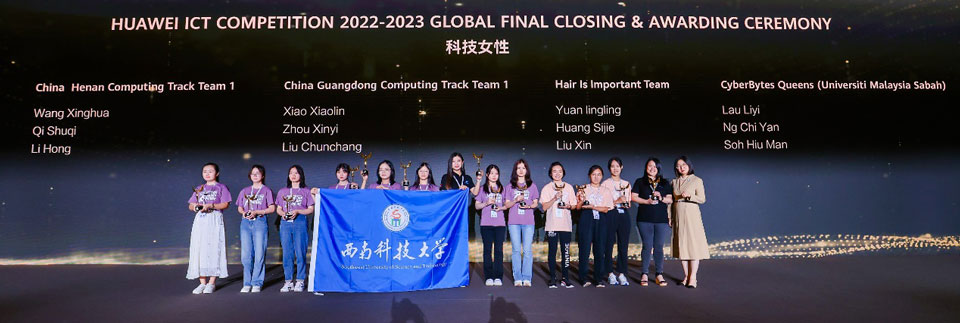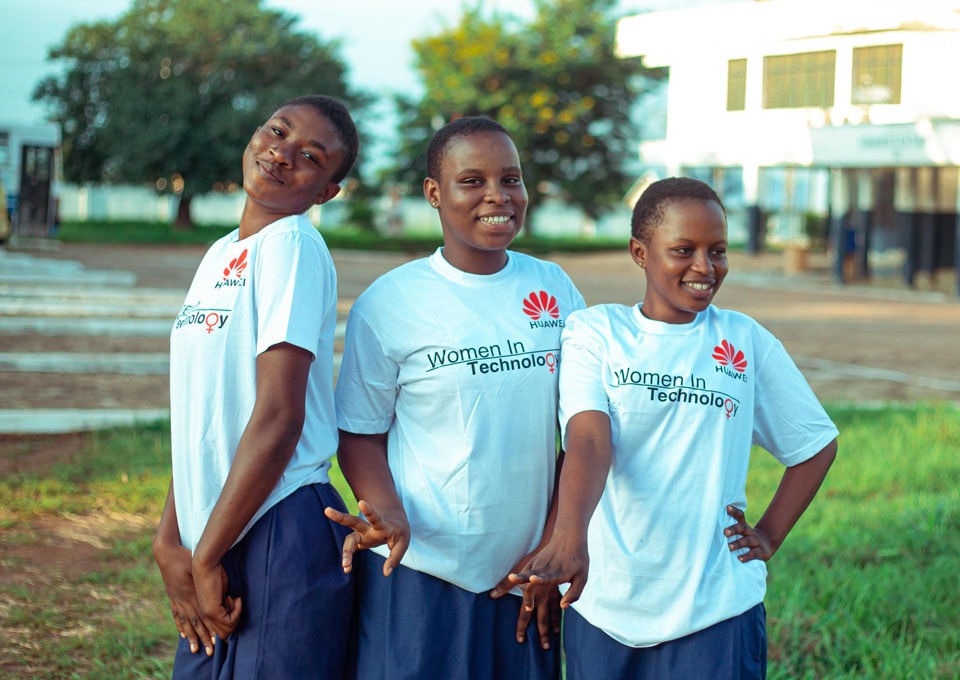Industry Ecosystem
Improving Digital Skills to Unleash the Power of Women
Huawei actively provides training and resources to help women overcome entry barriers to the tech sector and drive industry growth.


By Vicky Zhang, Vice President, Corporate Communications, Huawei

The four winning teams of the Women in Tech Award at the Huawei ICT Competition 2022-2023

Technology talent is one of the keys to unlocking digital transformation and digital productivity in the digital era. As technologies continue to evolve, women are playing a bigger role in this tech sector.
According to Forbes, the fastest growing force in the world is not emerging economies such as China and India, but women. The rise of the "She Economy" has allowed more women to participate in the technology sector and showcase their talents in fields like artificial intelligence, the Internet, and new energy. According to Deloitte's latest report on women in technology, female representation in large global tech firms averaged nearly 33% in 2022, marking a significant increase over 2021. Employment in the technology sector, especially for women, has also begun to recover faster than in many other industries.
However, women frequently do not receive the opportunities they deserve in the tech industry, making it hard for them to get the training and advancement offered to their male peers.
Since the pandemic, industries with traditionally lower levels of female representation have employed even fewer women workers. According to the World Economic Forum's Global Gender Gap Report 2022, the time required to achieve gender equality, if we continue at our current pace, has increased from 99.5 years to 132 years. In the field of cloud computing, for example, women account for only 14% of the workforce, and only 20% of people working in engineering are women. It is often more difficult for women to break into emerging fields than it is for men. This means that industry leaders and policymakers are responsible for stepping up and actively pursuing gender equality by improving women's skills, which in turn will help drive economic recovery.
Huawei has launched several Women in Tech projects since 2017 to address these concerns. Under its "Tech for Her, Tech by Her, Tech with Her" strategy, the company aims to create more opportunities for women to learn key digital skills. It is also committed to applying its own technologies to improving women's health, well-being, and leadership in the digital era. Women in Tech has become one of the company's key CSR programs, running in more than 50 countries around the world.
Leaving no one behind in the digital world
As an ICT industry leader, Huawei is in a prime position to ensure that women are a critical part of the technology industry. Female representation and participation bring new perspectives that can create both technological and business value.
Responding to the UN's call to support the Sustainable Development Goal on Gender Equality was therefore an easy choice for Huawei. By helping countries formulate better development policies for women, the company is working to ensure that everyone, regardless of age, gender, or nationality, can benefit from technology in the digital age, so that no one is left behind in the digital world.
To specifically bridge the gender gap in technology, Huawei has also launched digital technology enablement programs for women in multiple countries, including Ghana, Bangladesh, and Malaysia.
Bangladesh: Building a digital skills learning platform with the Digital Training Bus
While the Bangladesh government has been pursuing a digital agenda, many women from remote areas have been missed by these initiatives. In 2017, Huawei worked with the Bangladesh government's ICT Division and local carrier Robi Axiata to launch the Digital Training Bus project. Six custom built buses, each equipped with 25 workstations, were sent to rural areas to train women in digital skills. The project trained 240,000 women in 64 regions across Bangladesh, helping the country promote gender equality and achieve long-term economic growth.
Connected on Wi-Fi, these buses allowed Bangladesh women in remote areas to receive customized digital skills training. By learning to use the Internet and apps such as mobile banking, more women are now able to access a broader array of information and connect to others around the world.
Malaysia: Partnering with the Women Leadership Foundation (WLF) to develop female leadership
Offering more than 3,000 ICT courses delivered by 100 lecturers, the Huawei ASEAN Academy was launched in Malaysia to train digital talent in the region.
In 2021, Huawei and the Malaysian WLF signed an MoU on creating a female leadership development program. The two parties agreed to provide ICT skills and leadership training for Malaysian women through the Huawei ASEAN Academy. The program aims to create more opportunities to foster and identify female leaders and promote the advancement of women by equipping them with digital and leadership skills. The program trained 2,500 women through tailored courses on business analysis, big data, artificial intelligence, and blockchain. This program provided more opportunities for women, and cultivated leaders for the country's digital transformation.

Figure 1: Huawei has been providing digital training for women in Ghana.
Ghana: Building alliances to bring digital skills to high school students and women in rural areas
Huawei began partnering with Ghana's Rebecca Foundation in 2021 to provide training in coding, including programming languages, and fintech for women in rural areas (as shown in Figure 1). Women in the northern, western, and eastern regions of Ghana are often held back by economic hardship, so this project was tailored to empower them to improve their prospects with digital skills.
In 2022, Huawei partnered with Ghana's Ministry of Communications and Ministry of Education to equip high school girls with digital skills. Focusing on artificial intelligence, privacy protection, cybersecurity, and online safety, the project benefited more than 100,000 female high school students.
Focusing on equity and motivating women professionals
Fairness, justice, and opportunity are becoming increasingly important in the digital age. As a leading global ICT solutions provider, Huawei is committed to giving back to the communities we serve and promoting skills improvement and social participation for women. As part of these efforts, Huawei issued its Statement on Gender Equality within the company and holds events and creates awards for women to encourage participation in the tech industry and provide them with more opportunities.
The Huawei white paper on diversity for fairness, justice, and opportunities
In 2022, Huawei released its first white paper on diversity and launched a new diversity initiative, hoping to contribute more to social equity and diversity. The white paper examines five company's initiatives presented in the company's Statement on Gender Equality: enhancing diversity and ensuring equality in recruitment; promoting women leadership at all levels; providing career and family care to employees; nurturing an open, inclusive, and secure corporate culture; and providing education, training, and digital opportunities to all.
The Seeds for the Future program: Encouraging women to participate in the technological revolution
Seeds for the Future is Huawei's flagship global CSR program for young people. It aims to cultivate ICT talent; build bridges between countries and cultures through scholarships, academic competitions, and online training; and provide women with training in digital and professional skills. Through this program, Huawei shares its extensive ICT expertise and experience, helping trainees better understand cutting-edge ICT and build their own pool of expertise.
Women account for more than 30% of participants in the Seeds for the Future's ICT training programs.

Figure 2: Martha, Esther, and Gladys (from left to right) from Ghana won the Women in Tech Award in the 6th Huawei ICT Competition.
The Huawei ICT Competition & the Women in Tech Award
The annual Huawei ICT Competition was launched in 2015 to give college students from around the world the chance to cultivate their innovation capabilities using new technologies and platforms.
In 2022, Huawei created the Women in Tech Award for outstanding women who participate in the ICT Competition. The award is intended to encourage more women to participate in technological innovation and drive the growth of the ICT industry as a more inclusive and diverse paradigm.
At the 6th Huawei ICT Competition Global Final in 2022, three women from Kwame Nkluma University of Science and Technology in Ghana were named winners of the first Women in Tech Award for their AI-based Water Quality Monitoring Solution(as shown in Figure 2). In 2023, four teams from University Malaysia Sabah, Luoyang Institute of Technology, Zhuhai City Polytechnic, and Southwest University of Science and Technology won the award . The women that participated in the competition believed it not only gave them valuable experience, but also proved that they could excel in the technological sector, stating, "In the future, we will continue to explore these technological fields. We hope that our experience will inspire more Ghanaian women to enter this field, and lead technological innovation, as well as promote gender equality and social inclusion."
The European Leadership Academy
In August 2021, Huawei held its first ever Summer School for Female Leadership in the Digital Age in Lisbon, Portugal. Huawei selected 27 participants from 1,225 applicants from the EU's 27 member states to participate in a week-long summer school that included a masterclass, team projects, and cultural experience courses. Training included coding courses, and outstanding female entrepreneurs and executives from all walks of life were invited to share their experiences with the students. By the end of 2022, five more European Leadership Academy sessions had been successfully completed.
These are just some of the many programs companies like Huawei are running to help bridge the digital gender gap. Technology has no gender, and inclusiveness is essential if we want to see women unleash their potential and the technology sector to grow.
- Tags:
- Digital Transformation





